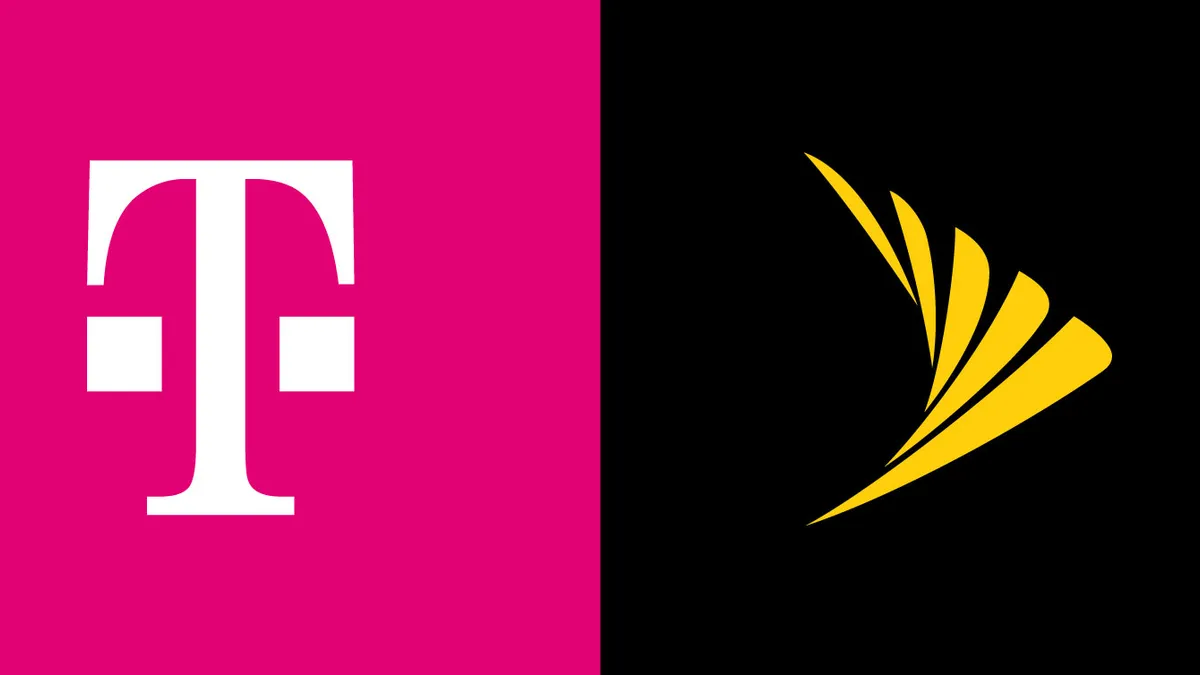UPDATED, April 1, 2020: T-Mobile announced Wednesday it closed on its $26 billion merger with Sprint to create the "New T-Mobile." Officials pledged the new company will help create “a supercharged Un-carrier that will deliver a transformative 5G network.”
Having overcome a lawsuit and won approval from federal regulators, the company said it is committed to "building the world’s best broad and deep nationwide 5G network," with "lightning-fast speeds" in urban and rural areas.
The deal will drive a planned investment of $40 billion into the New T-Mobile network in the next three years. With the closing, CEO John Legere officially stepped down and was replaced by Mike Sievert.
Dive Brief:
- A judge ruled today to approve the proposed merger of Sprint and T-Mobile and reject a lawsuit brought by 13 states and Washington, DC that looked to block the deal.
- In a written order, Judge Victor Marrero of the U.S. District Court for the Southern District of New York said the merger "is not reasonably likely to substantially lessen competition" among telecom companies, and should be allowed to proceed. Marrero also said, given T-Mobile's "maverick" nature that has made "numerous pro-consumer changes," the merger would allow it to continue its "undeniably successful business strategy for the foreseeable future."
- The decision is another step toward a fast, nationwide 5G network, according to supporters of the deal. "The broad and deep 5G network that only our combined companies will be able to bring to life is going to change wireless ... and beyond," T-Mobile CEO John Legere said in a statement. Federal Communications Commission (FCC) Chair Ajit Pai issued a statement saying the merger would help close the digital divide, and agreed it can help accelerate 5G deployment.
I’m pleased that a federal court has approved the @TMobile/@sprint transaction. Post-merger, the company has committed to bringing #5G to 99% of Americans within 6 years. The deal will also put critical mid-band spectrum assets to use. This is a big win for American consumers. pic.twitter.com/2ofEqxmDBq
— Ajit Pai (@AjitPaiFCC) February 11, 2020
Dive Insight:
The state attorneys general had opposed the merger on antitrust grounds, arguing the $26 billion deal would reduce wireless service and raise prices for millions of customers. But Marrero said that argument is "misleading in this particularly dynamic and rapidly changing industry."
He also said that Dish Network’s promises during the trial late last year to create a fourth telecom network persuaded him they "will take advantage of its opportunity," and open up a "broad range of spectrum that had heretofore remained fallow." T-Mobile has made promises in the past that the deal will enable high-speed 5G home internet, and pledged to provide free access to the network to all first responders for 10 years.
Opponents remain unconvinced. In a statement posted to her website, Gigi Sohn, former counselor to past FCC Chair Tom Wheeler, said "consumers will be the losers" in this transaction, which she said "would lead to unprecedented concentration in both the national and local mobile wireless markets, resulting in higher prices and less competition."
And in a tweet, California Attorney General Xavier Becerra said, despite the decision, "we won’t hesitate to stand up for consumers." Reuters reported an appeal to the decision is likely.
Our fight to oppose the #Sprint #TMobile merger sends a strong message: even in the face of powerful opposition, we won't hesitate to stand up for consumers who deserve choice & fair prices. We'll stand on the side of competition over mega mergers, every time.
— Xavier Becerra (@AGBecerra) February 11, 2020
Even with the prospect of an appeal, it seems likely this deal is in the final stages of closing. The FCC has already given its approval, while in their joint announcement, T-Mobile and Sprint said the merger "remains subject to certain closing conditions, including possible additional court proceedings, and satisfactory resolution of outstanding business issues among the parties."












